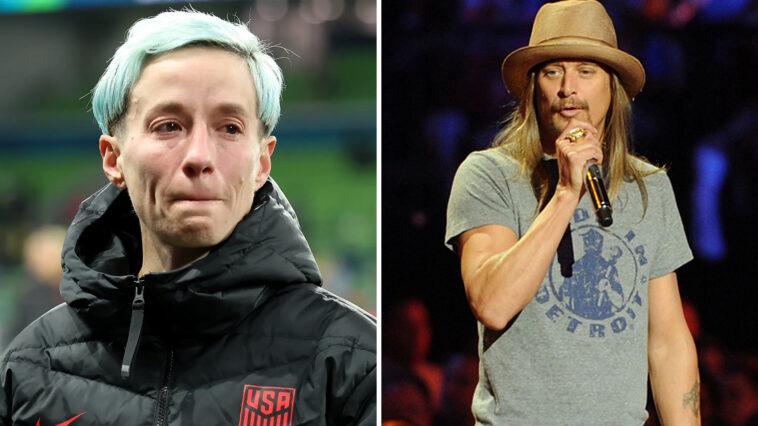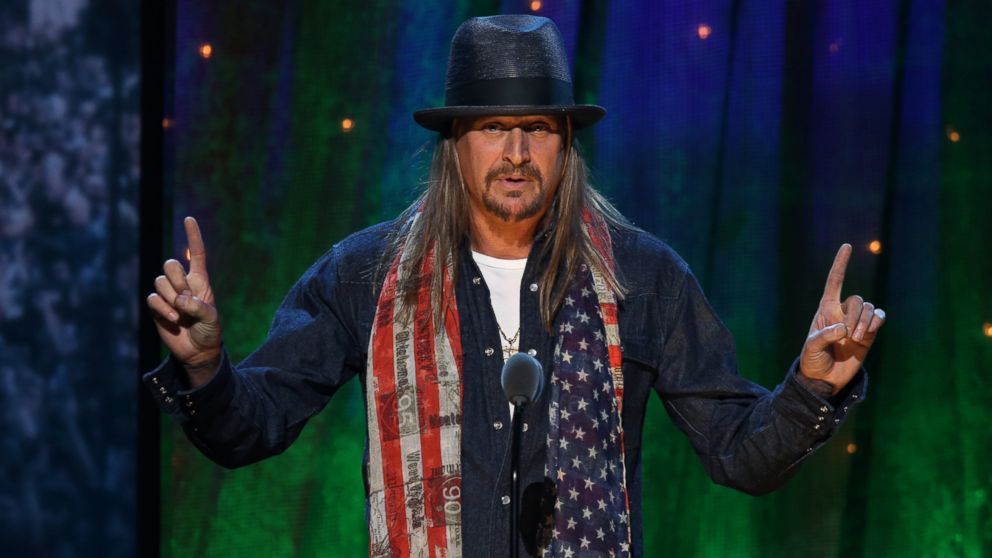CELEBRITY
Kid Rock To Megan Rapinoe: “If you hate America, you shouldn’t represent America.” Read more in comment.

Kid Rock To Megan Rapinoe: “If you hate America, you shouldn’t represent America.”
Ah, the world of celebrity opinions — a place where logic often takes a back seat to
emotion, where common sense is overshadowed by sensationalism. Enter Kid Rock,
the self-styled rebel rocker, and Megan Rapinoe, the renowned U.S. Women’s
National Team soccer star. After Rapinoe’s heartbreaking penalty miss at the
Women’s World Cup, Kid Rock seized the opportunity to share his profound
thoughts, “If you hate America, you shouldn’t represent America
Before we delve into this philosophical pearl of wisdom, it’s important to note that
Rapinoe has never publicly stated that she “hates America.” She has, however, been
critical of certain policies and societal issues, which according to Kid Rock’s doctrine,
is tantamount to outright treason.
Kid Rock, a musician whose political acumen is as well-known as his ability to
combine country, rock, and rap into a musical experience, decided to put on his
patriot hat and tell Rapinoe what’s what. Because, after all, what’s a penalty miss in
a crucial game if not a golden opportunity to discuss patriotism?
“If you hate America, you shouldn’t represent America,” Kid Rock proclaimed,
perhaps from atop a bald eagle or beside a stack of apple pies. His profound insight
into the correlation between a missed penalty and love for one’s country is
something that will undoubtedly be studied by political scientists and philosophers
for generations to come.
Rapinoe’s missed penalty, in Kid Rock’s eyes, was more than just a failure to score in
a soccer game. It was a symbolic failure to uphold the values of America. Because in
the grand tradition of confusing sports with politics, nothing says “l love my
country” like scoring a goal, and nothing says “l hate my country” like missing one.
But Kid Rock’s wisdom doesn’t stop there. His statement raises critical questions
about what it means to represent America. Must one agree with every policy,
embrace every cultural norm, and sing along to every lyric of Kid Rock’s
discography to truly love and represent the United States? According to Kid Rock’s
school of thought, the answer is a resounding yes.
The logic is simple: If you criticize, you hate. If you hate, you shouldn’t represent.
Therefore, if you criticize, you shouldn’t represent. It’s a syllogism worthy of
Aristotle himself.
This revolutionary idea could reshape the very fabric of American society. Imagine a
world where only those who never criticize their country can be its ambassadors.
Diplomats would be selected based on their ability to nod and smile rather than
their understanding of international relations. Politicians would campaign on
platforms of unbridled enthusiasm rather than nuanced policy proposals.
And what about the rest of us mere mortals? Should we refrain from voicing our
concerns about our nation, lest we be accused of hating it? Perhaps we should all
follow Kid Rock’s example and sing ballads about the infallibility of America while
wearing a flag-themed tank top.
But let’s not be too harsh on Kid Rock. He’s merely expressing a sentiment that
many feel but few articulate. In his world, loving your country means never
questioning it, never challenging it, never striving to make it better. It’s a love that’s
pure, simple, and entirely unconditional, much like a dog’s love for its owner or a
fan’s love for a one-hit wonder.
Rapinoe, for her part, seems unlikely to be swayed by Kid Rock’s profound
guidance. She has demonstrated time and again that her love for her country is not
blind but thoughtful, critical, and committed to positive change.
In the end, Kid Rock’s statement is a reflection of a broader struggle in American
society — a struggle between those who see love of country as unquestioning
loyalty and those who see it as a commitment to continuous improvement. It’s a
struggle that won’t be resolved by missed penalties or catchy soundbites, but
through genuine dialogue and mutual respect.
So let us thank Kid Rock for his unsolicited wisdom. His words, though misguided,
serve as a reminder that patriotism is not a one-size-fits-all concept. It can be loud
and boisterous, like a Kid Rock concert, or thoughtful and nuanced, like a Rapinoe
interview.
And as we reflect on this bizarre intersection of sports, music, and patriotism, let’s
remember that the true beauty of America lies in its diversity of thought, its
willingness to challenge itself, and its ability to grow and change. Even if it means
missing a penalty now and then.














